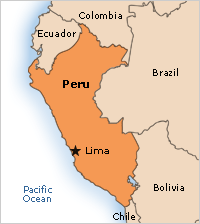Populist presidential candidate takes early lead in Peru
Former army officer Ollanta Humala, a polarizing populist, took an early lead in Sunday's presidential elections but fell far short of the majority needed to avoid a runoff, according to first official results.

The political newcomer had 27.6 percent of the vote with 30.4 percent of the ballots counted. Pro-business former congresswoman Lourdes Flores had 26.7 percent, and Alan Garcia, a center-leftist ex-president, had 25.7 percent.
The top two vote-winners from among 20 candidates will face each other in a runoff set for late May or early June.
Hours after being taunted by hundreds of opponents as he cast his ballot, Humala urged his followers to be calm and avoid violence.
"We see a large social fracture in the country and we don't want to deepen it," Humala said at his campaign headquarters.
A victory by Humala could tilt this Andean nation leftward toward Venezuela's Hugo Chavez. His main challengers vow to generally maintain free-market policies that have generated strong growth but little improvement in the lives of poor Peruvians.
Humala, 43, has instilled fear in many Peruvians, especially the middle and upper classes, by identifying with Chavez, Venezuela's militantly anti-U.S. president.
Hundreds of hostile protesters trapped the former army lieutenant colonel and his wife for nearly an hour at their Lima polling station with chants of "Assassin" and "You're the same as Chavez." A few threw rocks.
After voting, Humala and his wife were escorted to a car by riot police with clear plastic shields. Lloyd Axworthy, the former Canadian foreign minister heading an international observer team, accompanied the couple.
The "assassin" chants were an apparent reference to allegations that Humala committed human rights abuses in 1992 as the commander of a counterinsurgency base in Peru's eastern jungle. He denies any wrongdoing.
Humala, a law-and-order nationalist, has heavy support among Peru's poor, who feel bypassed by the country's recent strong economic growth. Most of the poor live in Andean mountain communities, where the Quechua-speaking inhabitants have suffered centuries of racial and ethnic discrimination by Peru's European-descended elite.
Exit polls showed Humala with overwhelming leads in locations such as Ayacucho, a mountain state that gave birth to the extreme-left Shining Path guerrillas a quarter century ago.
"In a country where most citizens suffer from racism, elections become an opportunity for them to take revenge," said human rights activist Wilfredo Ardito.
Humala belongs to a high-profile mestizo clan of avowed racists who believe Peru's "copper-colored" majority should have superior status over whites. He insists he does not share his relatives' views, but they have benefited him anyway.
Humala's image as a stern military man willing to fight crime and punish the corrupt has also been a powerful factor.
"I'm voting for Ollanta because he'll make it safer and get rid of the corrupt," said Nancy Perez Malpartida, a 45-year-old fruit vendor. "What's lacking here is a strong hand to battle street crime. With no police around, we have no way to defend ourselves."
Humala has pledged to favor Peruvian-owned businesses over foreign investors, raise taxes on foreign companies, spend more on the poor and rewrite Peru's constitution to strip power from a political class widely viewed as corrupt.
He openly admires the 1968-75 leftist dictatorship of Gen. Juan Velasco, who took over Peru's media, implemented a largely failed agrarian reform and forged close ties with the Soviet Union, reports the AP.
I.L.
Subscribe to Pravda.Ru Telegram channel, Facebook, RSS!


